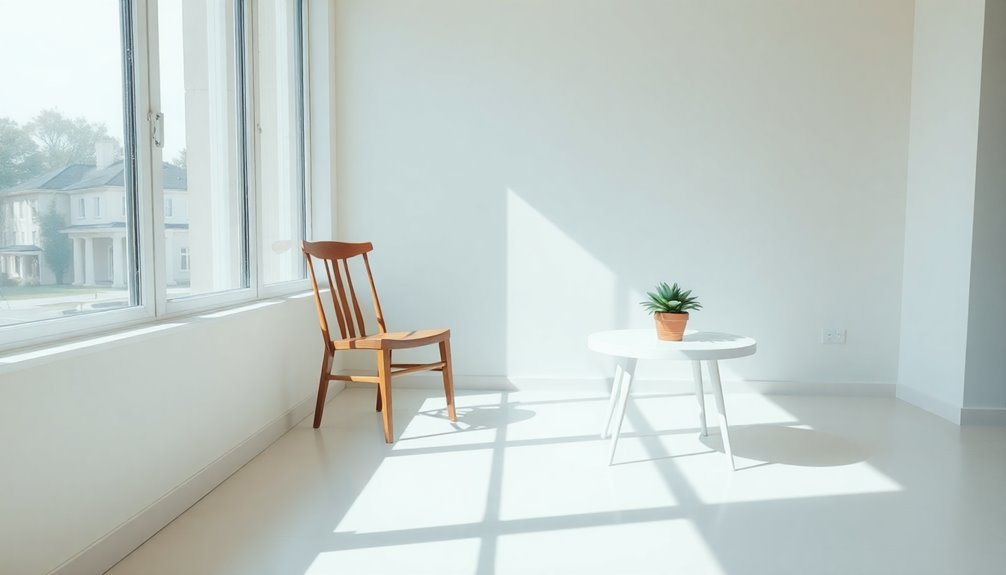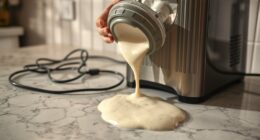Yes, decluttering your life, both physically and mentally, can greatly improve your overall well-being and happiness. By embracing psychological minimalism, you can reduce mental clutter and stress, helping you focus on what truly matters. This practice aligns your actions with your core values, fostering authenticity and emotional clarity. Prioritizing experiences over possessions leads to deeper connections and lasting memories. Discover how to reform your mindset and create a more fulfilling life through intentional choices.
Key Takeaways
- Decluttering enhances mental clarity by reducing mental clutter, allowing individuals to focus on what truly matters in their lives.
- Simplifying thoughts through psychological minimalism leads to reduced stress levels and improved emotional well-being.
- Embracing minimalism fosters authenticity and fulfillment by aligning actions with personal values and intentions.
- Prioritizing experiences over material possessions strengthens relationships and contributes to overall happiness and life satisfaction.
- Incorporating stillness and downtime into daily routines supports emotional regulation and enhances creativity, promoting a healthier lifestyle.
Understanding Psychological Minimalism
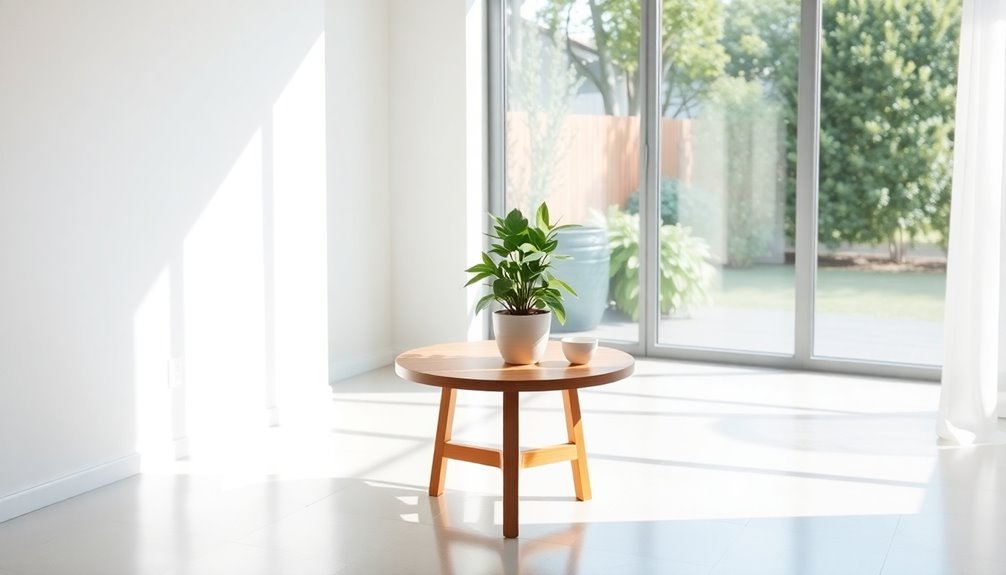
While you might think of minimalism as simply decluttering your physical space, understanding psychological minimalism reveals its deeper purpose: simplifying your inner world.
This practice focuses on identifying and letting go of burdensome thoughts, habits, and commitments that contribute to mental clutter. By decluttering your mind, you can experience significant psychological benefits, including enhanced mental clarity and reduced stress levels.
Living with intention allows you to focus on what truly matters, aligning your actions with personal values. Engaging in practices like journaling and reflecting helps you recognize distractions and cultivate a calm internal state.
Ultimately, psychological minimalism promotes authenticity and fulfillment, enabling you to embrace the present moment while letting go of unnecessary mental noise. Additionally, it supports emotional resilience through reduced distractions, allowing for a more balanced and peaceful mind.
The Impact of Mental Clutter
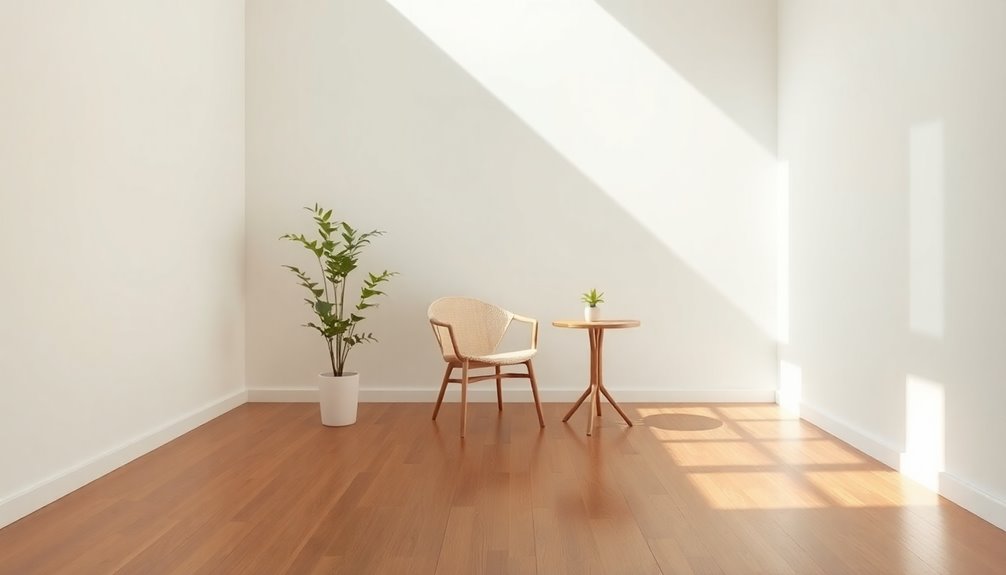
As you navigate daily life, mental clutter can pull your attention in countless directions, making it challenging to focus on what truly matters. This distraction often leads to feelings of stress and anxiety, as unprocessed thoughts and unmet expectations accumulate.
You might find yourself checking your phone over 100 times a day, which only adds to the overwhelm. Decluttering your mental space is essential for reclaiming your focus and energy. By recognizing this clutter, you can prioritize tasks and enhance your decision-making capabilities.
Simplifying commitments allows you to foster mental clarity, ultimately leading to a more intentional and meaningful life. Addressing mental clutter isn’t just about productivity; it’s about improving your overall well-being and reducing burnout. Engaging in personal growth resources can also provide valuable strategies for coping with life’s challenges.
The Benefits of Psychological Minimalism
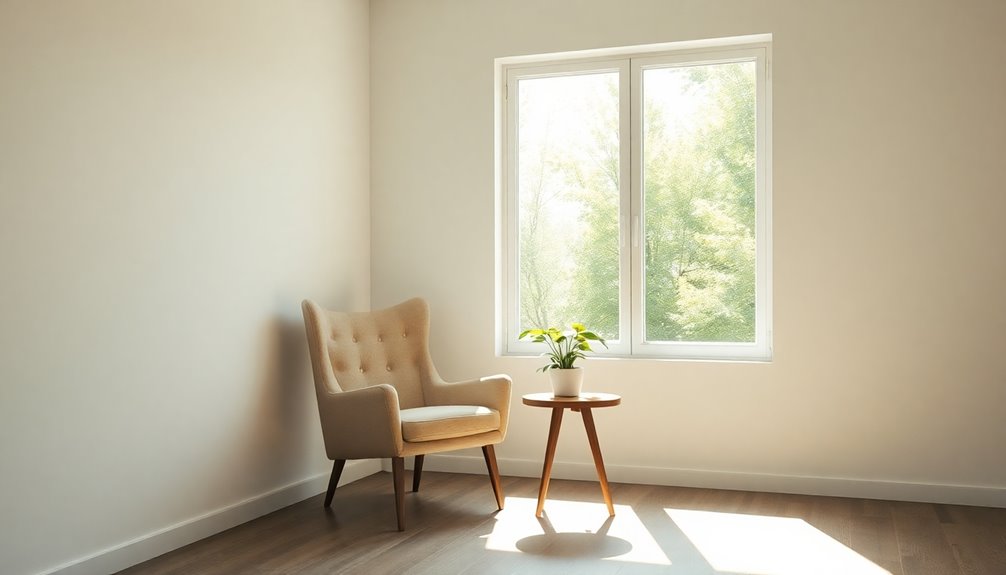
Embracing psychological minimalism can greatly transform your daily experience by reducing mental noise and enhancing focus. By simplifying your thoughts, you can improve your mental wellbeing, leading to lower stress and anxiety. This practice allows you to align your actions with your values, helping you make intentional decisions and fostering a sense of purpose. As you declutter your mind, you’ll discover more meaningful connections and experiences, enriching your relationships. The benefits of minimalism not only enhance your focus and productivity but also contribute to a joyful and fulfilled life. Additionally, cultivating self-regulation skills through minimalism can further aid in managing emotions and behaviors effectively.
| Benefits of Minimalism | Effects on Life |
|---|---|
| Reduces mental clutter | Enhances mental clarity |
| Lowers stress levels | Improves emotional wellbeing |
| Aligns actions with values | Fosters deeper connections |
How to Practice Psychological Minimalism
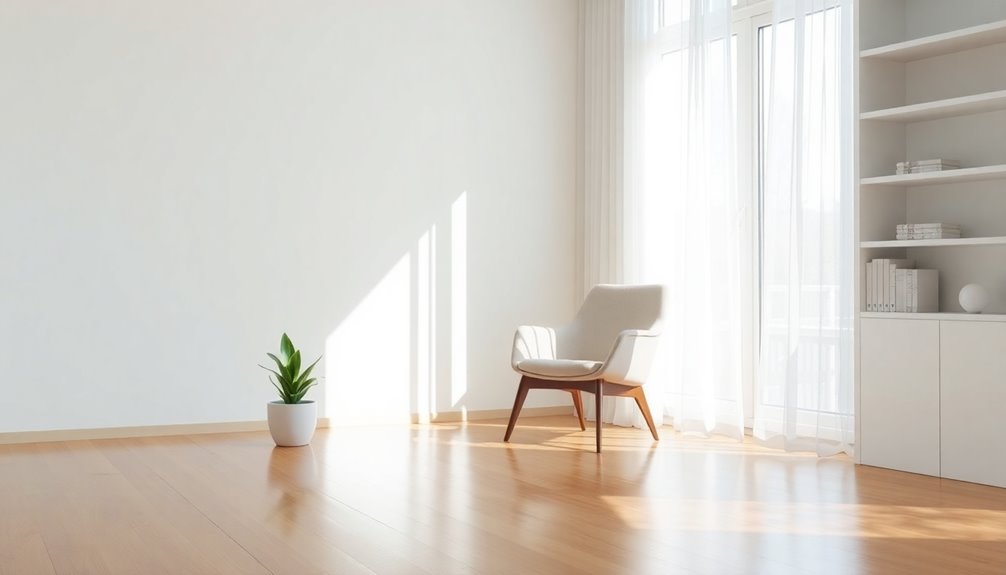
How can you effectively practice psychological minimalism in your daily life? Start by identifying your mental clutter. Reflect on recurring stressors and create a mental clutter inventory to recognize distractions. Journaling can help declutter your mind, too.
Next, set boundaries for your attention. Limit notifications and designate specific times for checking emails and social media to prevent overwhelming mental clutter.
Embrace mindfulness to break free from unproductive thought patterns and let go of habits that don’t serve you. Focus on your core values, using them as a guide for decision-making and prioritizing your time.
Finally, embrace stillness and downtime; quiet moments can foster the emotional space needed for mental health and creativity. Incorporating effective relaxation techniques can also help reduce stress and promote a calm mindset.
Focus on What Truly Matters
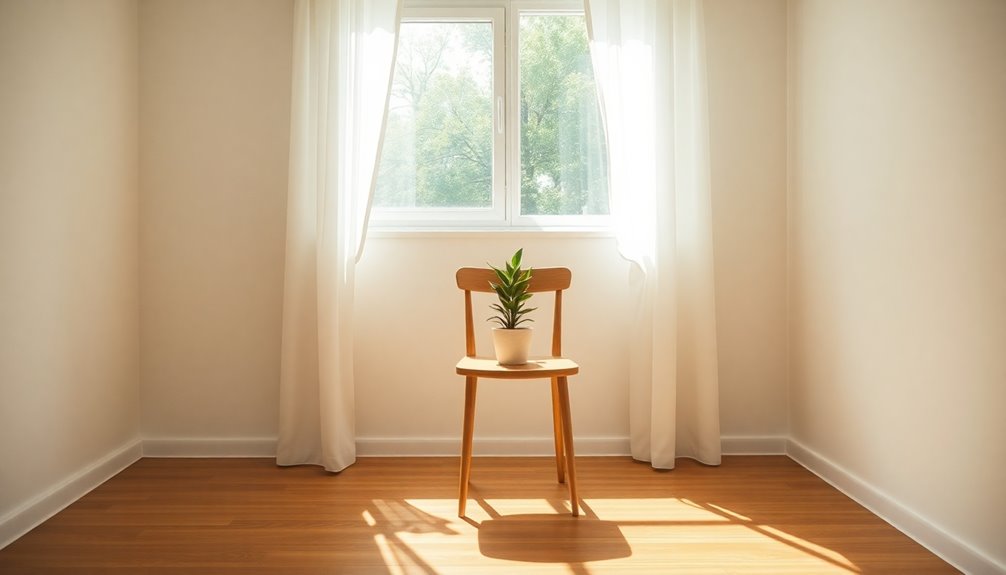
When you focus on what truly matters, you create a roadmap for a more intentional life. By identifying your core values, you can simplify your life, prioritize commitments, and make decisions that align with what brings you joy.
This clarity reduces mental clutter, which is essential for maintaining good mental health. Regular reflection on your values helps you understand what resonates with you, leading to more meaningful connections and experiences.
Letting go of commitments that don’t serve your values allows you to engage in activities that contribute to your sense of purpose. Ultimately, embracing these benefits of decluttering enhances your overall well-being and life satisfaction, paving the way for a fulfilling existence aligned with your personal priorities. Moreover, recognizing signs of stagnation in your life can further guide your decluttering journey, ensuring you stay aligned with your evolving values and goals.
Embrace Stillness and Downtime
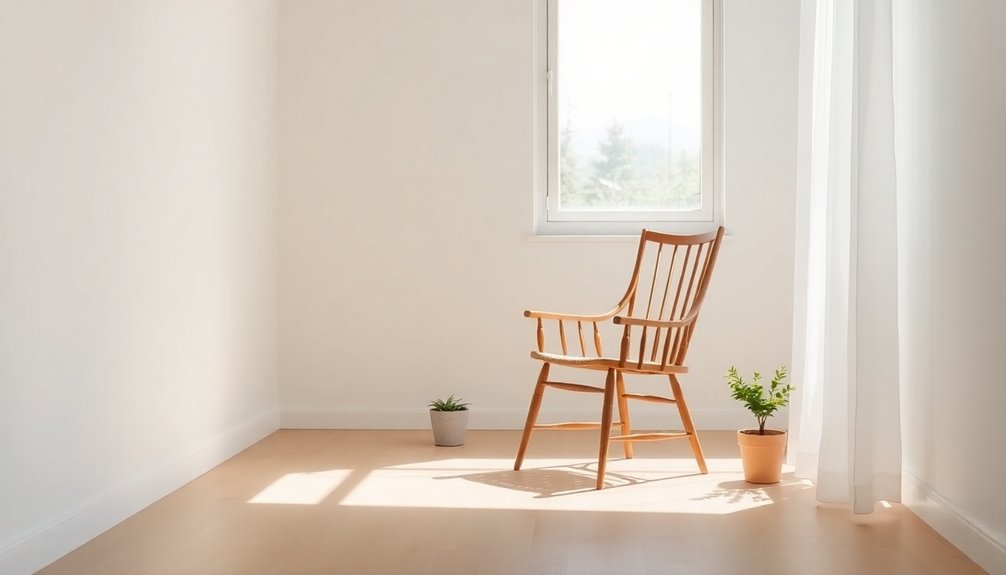
In today’s fast-paced world, taking time to rest isn’t a luxury—it’s essential for your mental health.
By embracing quiet moments and incorporating mindfulness practices, you can boost your creativity and emotional stability.
Allow yourself the space to recharge; it’s a key step toward a more intentional and fulfilling life. Quality sleep enhances creativity and problem-solving skills, making it even more vital to prioritize downtime.
Importance of Rest
Although modern life often glorifies constant activity and busyness, embracing stillness and downtime is essential for your mental health.
Taking regular breaks allows your brain to rest and recover from daily stimuli, leading to improved focus and creativity. Research shows that prioritizing rest can reduce stress and anxiety levels, fostering a calmer mindset.
Engaging in quiet moments, like meditation or mindful walks, helps you achieve emotional clarity and resilience, which supports better decision-making. Additionally, understanding the role of emotional regulation can further enhance your ability to manage stress and maintain balance in your life.
In a culture that often overlooks the importance of downtime, remember that those who integrate stillness into their routines experience greater life satisfaction and lower burnout rates.
Ultimately, these moments of rest can notably enhance your productivity and mental well-being.
Cultivating Mindfulness Practices
Cultivating mindfulness practices is essential for enhancing your mental well-being, as it allows you to embrace stillness and downtime amidst life’s chaos. When you feel overwhelmed, taking time to practice minimalism in your thoughts can be transformative.
Engaging in activities like meditation or mindful walks helps clear your mind, fostering peace and clarity. These quiet moments give your brain the chance to refresh and create new connections, enhancing your creativity.
Prioritizing downtime not only balances your work-life but also improves your emotional stability. By making regular periods of rest a part of your routine, you’ll find it easier to be present in the moment, reducing stress and leading to a more fulfilling life. Additionally, incorporating regular cleaning into your routine can further enhance your mental clarity by creating a more organized environment.
Benefits of Quiet Moments
How often do you take a moment to simply breathe and embrace stillness? In our fast-paced world, carving out time for quiet moments can considerably enhance your mental health.
These moments foster a sense of calm, allowing you to reflect and relax, ultimately improving your mood. Engaging in activities like meditation or mindful walking helps you focus and reduces stress by lowering cortisol levels.
By prioritizing downtime, you can cut through unnecessary things that clutter your mind and life. This approach not only supports emotional regulation but also enhances productivity in the long run. Additionally, optimal comfort in your environment, such as through the use of efficient heating solutions, can further contribute to a more serene atmosphere.
Embracing stillness is essential, not a luxury; it’s a practice that nurtures your mental and emotional well-being, making life more fulfilling.
Personal Experiences With Clutter
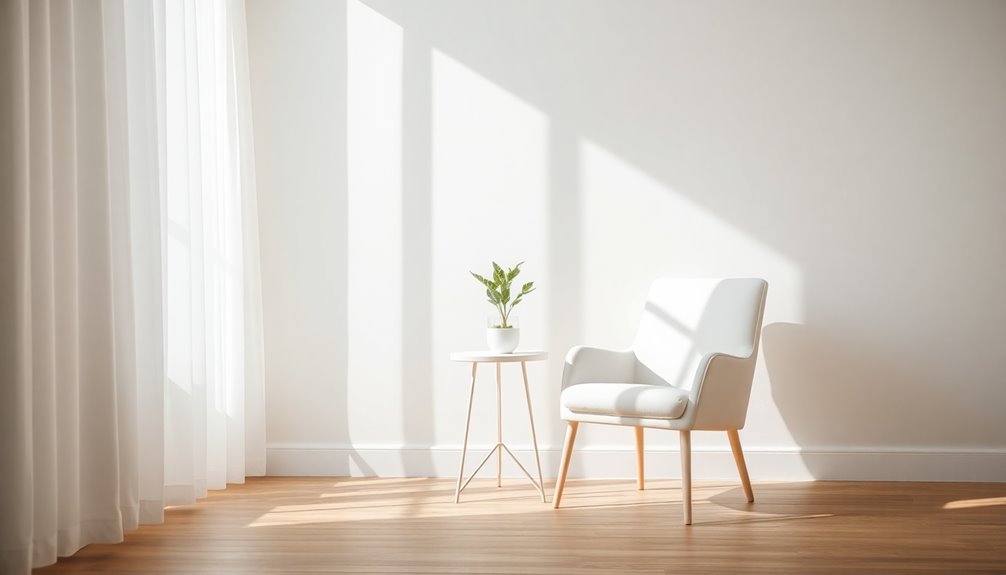
You’ve likely felt the weight of clutter during busy times, like the holidays, when emotional distress can rise.
Conversations with family often reveal a shared preference for experiences over material gifts, showing how many of us value simplicity.
Reflecting on your own experiences, you might recognize how a tidy space can lead to clearer thoughts and a lighter spirit. Moreover, creating a peaceful environment can significantly impact emotional well-being, similar to the role of end-of-life care in providing comfort during challenging times.
Emotional Impact of Clutter
As the holiday season unfolds, many find themselves surrounded by an overwhelming amount of gifts and decorations, which can lead to feelings of stress and anxiety. The emotional impact of clutter is real; it drains your energy and disrupts your mental well-being. You may prefer consumable gifts, recognizing that experiences bring joy without the burden of material things. Family conversations often highlight how decluttering can create emotional clarity, fostering a healthier mindset.
| Emotional Impact | Decluttering Benefits | Material Things vs. Experiences |
|---|---|---|
| Stress | Improved clarity | Experiences valued more |
| Anxiety | Enhanced well-being | Less clutter, more peace |
| Overwhelm | Sense of lightness | Focus on memories over items |
| Drained energy | Motivated mindset | Joy from shared moments |
| Chaos | Simplified living | Prioritize what truly matters |
Experiences Over Material Possessions
What do you truly cherish more: a pile of gifts that gather dust or the laughter shared during a memorable trip? Your personal experiences likely reveal that valuing experiences over material possessions can greatly enhance your life.
Clutter can weigh you down emotionally, leading to stress and anxiety. By embracing experiences, you nurture relationships and create lasting memories.
Consider these benefits of prioritizing experiences:
- Strengthened relationships
- Enhanced emotional well-being
- Reduced stress from clutter
- Increased happiness and life satisfaction
- Deeper, more fulfilling connections
When you shift your focus from accumulating possessions to cherishing experiences, you cultivate a richer, more meaningful life, free from the burdens of excess clutter.
Family Conversations on Simplicity
While discussing the clutter in our homes, families often uncover shared feelings about its emotional toll. You might realize that excess items contribute to stress and overwhelm in daily life, prompting deeper family conversations on minimalism.
During holidays, you may find a preference for consumable gifts or experiences, valuing memories over material possessions. These discussions can lead to collective decisions to prioritize decluttering efforts, fostering a shared commitment to create a more peaceful environment.
As you share personal anecdotes, you’ll see how simplifying spaces enhances mental clarity and overall well-being. Engaging in these conversations encourages reflection on values, helping each family member evaluate what truly brings joy and fulfillment to their lives, ultimately easing the emotional burden of clutter.
Frequently Asked Questions
What Is the Psychology Behind Decluttering?
The psychology behind decluttering centers on reducing mental clutter, which enhances your focus and productivity. A cluttered space can increase stress and anxiety, while decluttering gives you a sense of control and calm.
When you let go of unnecessary items, your brain releases dopamine, creating feelings of pleasure. By evaluating your belongings based on joy and practicality, you can align your possessions with your values, ultimately improving your overall well-being and life satisfaction.
What Is the 90-90 Rule for Minimalism?
Imagine your home as a garden, where every item either blooms or weeds out your peace.
The 90-90 Rule for minimalism invites you to assess your belongings by asking if you’ve used them in the past 90 days or plan to use them in the next.
If not, it’s time to let them go. This approach helps you cultivate a clutter-free space, fostering clarity and intention in your life’s landscape.
Does Decluttering Change Your Life?
Yes, decluttering can change your life.
When you clear out unnecessary items, you often find a sense of relief and mental clarity. You’ll feel less overwhelmed and more focused, which can lead to better decision-making.
Plus, living in a simplified space allows you to appreciate experiences and connections more deeply.
Is Decluttering an Action While Minimalism Is a Lifestyle?
Yes, decluttering is an action focused on removing unnecessary items from your space, while minimalism is a broader lifestyle choice.
When you declutter, you create a tidy environment, but minimalism encourages you to rethink your values and what truly matters in your life.
It’s about making intentional choices and prioritizing experiences over possessions.
Conclusion
In embracing psychological minimalism, you discover that less truly can be more. By decluttering your mind and environment, you make room for clarity and purpose. The theory that reducing distractions enhances your well-being holds true; prioritizing what really matters leads to a more fulfilling life. So, take a moment to pause, reflect, and let go of the excess. You might just find that in simplicity, you uncover the richness of your experiences and relationships.
